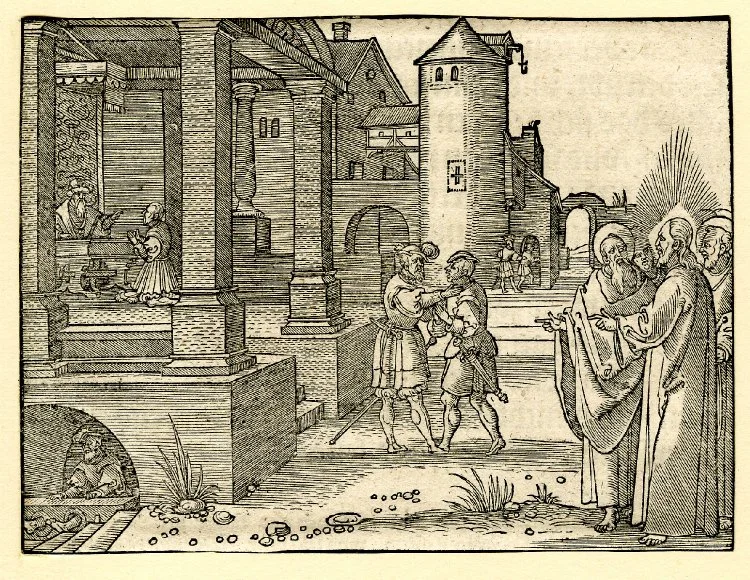Lectionary 24 A
Paul's weak in faith line is such a strange idea, but when paired with adiaphora--those secondary things of faith--something more interesting comes out. But that's now what I'll unpack at the end...
Semicontinuous Alternate Psalm - Exodus 15:1b-11, 20-21
In the greatness of your majesty you overthrew your adversaries;
you sent out your fury, it consumed them like stubble.
--Exodus 15:7
Verse 7 is cited through and editorial insert in Formula of Concord, Solid Declaration, Article 8: Person of Christ (FC, SD 8.87) to give a biblical reference for the allusion made in this passage to sinners standing before the full deity of Jesus, which consumes entirely. This is paired in this section with Jesus' promises to his followers as a human to keep the two natures of Jesus connected because the tension between Jesus' righteous judgment and his human sympathy.
Romans 14:1-12
All of Romans 14 is cited in Formula of Concord, Solid Declaration, Article 10: Ecclesiastical Practices (FC, SD 10.9) as an example of Paul showing "how one may yield and make concessions to the weak in faith" when changing the secondary things in a local congregation.
Welcome those who are weak in faith, but not for the purpose of quarreling over opinions… Those who eat must not despise those who abstain, and those who abstain must not pass judgment on those who eat; for God has welcomed them.
— Romans 14:1, 3
Verses 1 and 3 are quoted earlier in Solid Declaration, Article 7: Holy Supper (FC, SD 7.70) as support for the idea that communion is exactly for those who are weak in faith, aware of their own sinfulness, but who want to more closely follow Jesus.
Those who observe the day, observe it in honor of the Lord. Also those who eat, eat in honor of the Lord, since they give thanks to God; while those who abstain, abstain in honor of the Lord and give thanks to God.
— Romans 14:6
Verse 6 is cited later in Article 10 (FC, SD 10.13) to show Paul's difference between primary things and secondary things. Paul gives freedom to people to setting aside a day as holy or eating or not eating meat if they get to do it for the Lord. But if some insist that secondary things are primary and impose rules on others (thus making a second law), Paul real problems with that (cf. Colossians 2:16). But this verse and passage are more about giving people the room for the discipline that will help them follow Jesus better and not imposing your discipline on others involuntarily.
Matthew 18:21-35
Verses 23 thru 35 are cited in a footnote to The Small Catechism, The Lord's Prayer, The Fifth Petition (SC 3.15, n. 71) noting that these verses are the basis for the woodcut that goes with the petition.
TheoThru
It is worth remembering that Luther's non-contractual understanding of "forgive us our sin/debts/trespasses as we forgive those who sin against us/our debtors/those who trespass against us" comes from this gospel reading. The king did not demand that the servant first forgive all those indebted to him and to then be forgiven his debts. Instead, what we have here is an all too real reaction to the gospel. It is somewhat frightening, however, as a preacher, to just announce the gospel, knowing that some of the hearers will respond as the unjust servant did. From this fear comes the establishment of particular disciplines as mandatory, primary things in the form of a plea from the preacher for the congregation to do some work in response to the sermon. There is a fine line between encouraging people to live the gospel and telling them what works will make them Christian.
How do we preachers learn to trust the Holy Spirit to move?
How do we walk with those who are still exploring their faith in ways that expand their Christian freedom rather than force them into some unnecessary, external, and possibly unhelpful discipline?
When do we spend time reflecting on the magnitude of God's forgiveness?

